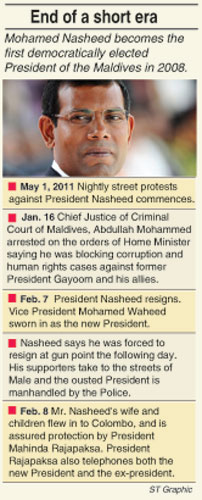Ousted Maldivian President, Mohamed Nasheed and two of his Party‘s senior members had to hide inside a hardware shop in Male to escape a teargas and baton attack by policemen, before being detected and dragged out like common criminals along the streets of the city, an official who was injured in the incident and now receiving treatment at a private hospital in Colombo, said.
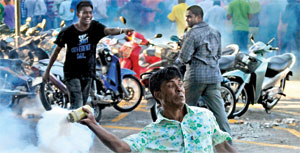 |
| An anti-government protester throws back a teargas canister at police during clashes in the Maldives capital Male on February 8. AFP |
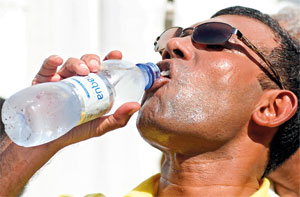 |
| Mohamed Nasheed drinks water as he emerges for his first public appearance to address his loyalists on February 8 in the capital Male a day after stepping down. AFP |
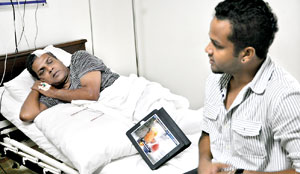 |
| Moosa Manik and son at the Durdan’s Hospital in Colombo. Pic by Lakshman Gunathileke |
Moosa Manik (51), a Member of Parliament (MP) of the Maldives and Chairman of the Maldivian Democratic Party (MDP) of President Nasheed, recollected how they hid inside the hardware shop, as riot police charged the crowds who had taken to the streets in protest at the ousting of the President last Wednesday.
“One policeman held me by the neck, as the others assaulted me after I was dragged out. I was semi-conscious when I saw one man pull out a knife and stab me on the head with it,” Manik told the Sunday Times from his hospital bed.
Along with him, President Nasheed was also dragged out by the policemen, but he did not witness what fate befell the President in the melee, Manik said.
Later, he was taken to a hospital in Male, by a relative who was a police officer, and brought to Sri Lanka in the early hours of Friday, to undergo medical treatment for multiple injuries he received, including a cut to his skull.
Leaving the country too had proved an ordeal for him and his family members, with the newly installed government releasing a list of names of people who could not leave Male.“After arguing with Immigration and Police officials for more than an hour, we, managed to get him onboard the flight to Colombo,” said Mudurikath Moosa, Manik’s son who is now by his bedside.
The street protests which culminated with the ousting of President Nasheed, began with the arrest of the Chief Justice of the Criminal Court of the Maldives, Abdulla Mohamed on January 16. While Nasheed’s government accused the judge of complicity with criminals, his opponents said this was a move to interfere with the judiciary.
Moosa Manik, however, said the ousting of the President had been instigated by former President Abdul Gayoom and his supporters who have joined forces with other extremist parties to capture power.
He was also critical of Vice President Dr. Mohamed Waheed who took office as President, after Nasheed was forced out of office.
“Under our Constitution, the Vice President can take over if the President is unable to discharge his duties, but now, he is attempting to change the Cabinet and turn everything around in an undemocratic manner,” Moosa said.
He also alleged that large scale arrests of MDP supporters have taken place, with around 500 detained so far, including his son-in-law, an MDP activist.
For members of the MDP who carried out a protracted campaign to restore democracy in the archipelago, Nasheed’s overthrow came as a shock, but not wholly unexpected.“
There have been moves by persons linked to Gayoom, to oust the government for some time. But they are making a big mistake, because the people of the Maldives have tasted democracy, and they do not want to go back to autocratic rule,” said Moosa, better known in his motherland as “Reeko Mossa”, being a well-known movie actor in his younger years.
The injuries he suffered have in no way dampened Manik’s desire to continue with the struggle for democracy. “The moment I get better, I am going back, even if they kill me. We have fought hard for democracy in our country. I have served many years in jail, but we will not allow the rights of our people to be hijacked in this manner,” he said.
Undoing of a democratically elected President
Maldivian Vice President Dr. Mohamed Waheed Hassna was sworn in as the acting President of the Maldives, after more than three weeks of anti government protests forced President Mohamed Nasheed out of office on Tuesday.
The resignation was the climax of nightly protests on the streets of the Maldivian capital of Male, triggered by the arrest of a senior judicial official, an unprecedented crisis in the mostly tranquil nation.
The street protests began with the arrest of the Chief Justice of the Criminal Court of the Maldives, Abdulla Mohamed on January 16, and have grown increasingly violent each day, forcing the government to seek assistance from the UN, as well as from the Commonwealth, for a team of legal experts to visit the country, to help resolve the impasse created between the government and the judiciary, since Abdullah’s arrest.
The government had accused Judge Abdullah of being in complicity with criminals, while members of the main opposition Progressive Party of the Maldives (PPM) have defended him, saying that the government is attempting to interfere with the work of the judiciary.
“The opposition has been inciting people, using hate speech to mobilise activists on the ground, while the government upholds freedom of speech as guaranteed under the present constitution. “The inflammatory speeches and incitement to violence is not something that the government can condone,” Maldivian Foreign Secretary Mohamed Naseer who was in Colombo in the last week of January, told the Sunday Times.
The government accused the Adhaalath Party of the Maldives, as well as the opposition PPM founded by former President Abdul Gayoom, of being behind the unrest.
The PPM had denied allegations of extremism. A PPM official in the Maldives said that the violence during the protests had been instigated by vigilantes unleashed by the government, many of whom are hardcore criminals released from prison under a special programme called ‘second chance.’
The PPM founded by former President of the Maldives, Maumoon Abdul Gayyoom and other opposition forces had called for the immediate releases of Judge Abdulla Mohamed, as well as the resignation of President Nasheed. “(President) Nasheed to step down and hand over power to his deputy.
It was in the light of the growing unrest that the government sought intervention by the UN and the Commonwealth, to send a team of legal experts to resolve the crisis.
The request was for a team of highly qualified retried judges to come to the Maldives and help reform the country’s judiciary.
By Friday, representatives of the UN and the Commonwealth, as well as a special envoy from India were in Male to monitor the situation.
A senior member of Nasheed’s Maldives Democratic Party (MDP), who is in Colombo, alleged that up to 500 of their supporters are in prison, after the ousting of the President.
Meanwhile, sources in Male said there seems to a growing radicalisation of the people of the country, which was visible from the destruction caused to some of the statues that were erected for the SAARC summit held there last December.
Calm returns to Male: Maldivian HC
The Maldivian High Commissioner to Colombo, Hussain Shihab said that calm has returned to the streets of Male, as new President Mohamed Wahid is in consultation to set up a National Unity Cabinet to replace the Cabinet of ousted President Mohamed Nasheed.
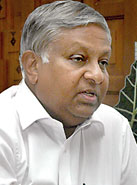 |
| Hussain Shihab. Pic by Saman Kariyawasam |
Pro-Nasheed protesters had taken to the streets after he was forced out of office on Wednesday, clashing with Police, leaving many injured.
High Commissioner Shihab said that, both the Commonwealth and the United Nations (UN) representatives are in Male, as well as a special envoy from India, to oversee developments in the country.
“The new President is meeting with members from all parties, and an announcement on the new Cabinet should come over the weekend,” High Commissioner Shihab told the Sunday Times.
Meanwhile, a small group of supporters of ousted Maldivian President Mohamed Nasheed gathered opposite the Maldivian High Commission in Colombo on Friday, to protest against the President’s removal.
Many were wearing yellow shirts and carrying yellow flags to symbolise the colour of the Maldivian Democratic Party (MDP) of President Nasheed, which took power in 2008, bringing to an end the 30-year old rule of Mohamed Abdul Gayoom. Some carried placards condemning the ousting of the President.
There was also a heavy presence of police personnel who cordoned off the entrance to the High Commission.
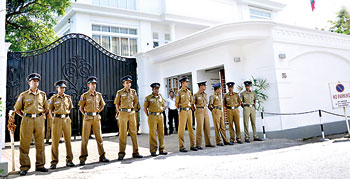 |
| The Maldives Embassy in Colombo ringed by policemen on Friday. Pic by Susantha Liyanawatte |
|




